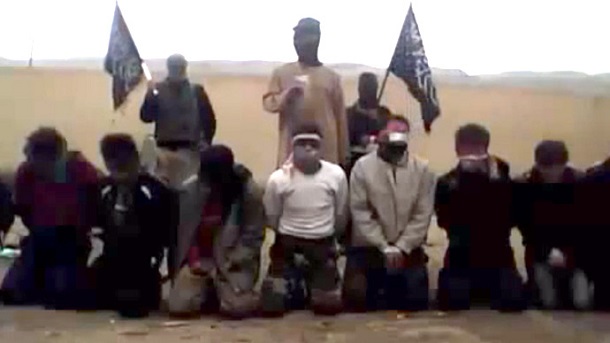![]()
By Crethi Plethi

Still image from a youtube video (posted may 2013) showing fighters of the Al Qaeda-linked Al-Nusra Front in Syria executing 11 men they say are Bashar Assad’s soldiers. Obama accuses Assad of murdering his own people, but Syrian rebels constantly commit atrocities against minorities and civilians. (source: nationalturk.com)
The Senate Foreign Relations Committee approved a resolution for Syria authorizing U.S. President Barack Obama to “order a limited military mission against Syria, with a 90 days limit and no US troops on the ground for combat operations.” The senators Bob Menendez (Dem) and Bob Corker (Rep) crafted the resolution. John McCain (Rep) voted in favor of the resolution as well, after his amendment was accepted which specified that the objective of the US mission should aim for “degrading the Assad regime’s capabilities to use chemical weapons and other weapons of mass destruction, while at the same time upgrading the lethal and non-lethal capabilities of vetted groups within the Syrian opposition.”
Next week, Obama hopes to receive full Congressional approval as well.
As I already noted in “Who Understands the Middle East?” — unless Western policymakers learn to deal with the Middle East in a realistic manner they will continue to make the same mistakes in dealing with the Middle East as they did in the past few years. And so it happens.
Of course, the humanitarian catastrophe in Syria is immense as it is in any war. And if the Assad regime did use chemical weapons in Damascus, they have crossed a “red line” as stated by Obama during a White House news conference, aug 20, 2012:
“We have been very clear to the Assad regime, but also to other players on the ground, that a red line for us is we start seeing a whole bunch of chemical weapons moving around or being utilized. That would change my calculus. That would change my equation.”
But the humanitarian card could have been played in a earlier stage during Syria’s two-and-a-half-year-old civil war as already 100,000 people in Syria have been killed (June 2013 UN estimate) and both sides are committing gruesome atrocities against eachother. Don’t make a mistake, in general the fighting in Syria developes along sectarian lines (Sunnis against Shiites, Christians and Alawites against Sunnis, Sunnis against Kurds) and sectarian civil wars are dirty.
So why is it a bad idea to strike Syria?
Using air strikes to punish the Assad regime for killing 1,400 civilians with chemical weapons creates a precedent for similar cases no matter which side is committing them. US credibility — which is already at a historic low point in the Middle East — is at stake if Obama decides to strike Assad but not act when the so-called “vetted groups” (or Iran) commit similar crimes against humanity. Remember Syrian rebel commander Abu Sakkar eating the heart of a dead SAA soldier?
Even so, it’s remarkable that John McCain’s amendment aims to “change the momentum on the battlefield in Syria.” In favor of who? The ‘heart-eating’ Free Syrian Army and the al-Qaeda affiliated anti-Western Al-Nusra Front? Does McCain (or Obama) really believe there’s a “good side” in this civil war? And what if Russia and Iran join the fray?
McCain’s amendment means it won’t be merely a punitive strike on specific military targets for crossing a “red line”, it’s more or less the ‘Libya strategy’ — weakening the ruling dictator — which meant the downfall of Colonel Gaddafi in the end. But of course, Syria isn’t Libya.
In fact, the Assad regime is now an Iranian puppet and the military chief of Iran’s elite Quds Force unit already stated that “they will support Syria until the end“. So Iran is not impressed. Consider this, when Israel’s Prime Minister Benjamin Netanyahu was planning strikes on Iran’s nuclear facilities, Obama asked him not to. So Netanyahu called them off. What do you think will Iran do when the momentum on the battlefield has changed in favor of the Sunni Islamists and Iran is capable of launching nuclear missiles because Obama’s Iran policy didn’t work?
By the same token, Hezbollah is deeply involved in the Syrian civil war in support of Assad and played a key role in recapturing al-Qusayr near Homs. Hezbollah isn’t going to leave the battlefield now the US is planning air strikes, in fact they will be dragged deeper into the conflict if Assad is considerably weakened by the air strikes.
As such, a US-led intervention could lead to multiple response scenarios — for example Iran, Hezbollah and Bashar al-Assad attacking Israel — but also a deeper involvement of Russia in Syria’s civil war. Russia will continue to act against US interests in the Middle East although they might first join a coalition to strike Assad, because Russia is signatory to the international ban on chemical weapons as well.
However, my main objection against air strikes is that an attack against Assad’s forces could strengthen the hand of the al-Qaeda linked Sunni jihadis who want to turn Syria into an Islamic state. This is probably not what McCain is intending with his amendment, but this is what happened after the multi-state military intervention in Libya, it nearly happened in Egypt (where the Egyptian military intervened and ousted Islamist president Muhammad Mursi), and could happen in Syria. This will only lead to a wider regional conflict that could drag in Lebanon, Jordan, Israel and Turkey.
Of course, the alternative isn’t promising either. If Assad survives the civil war, he will lead a fragmented country with Iranian military (maybe even nuclear) assets and next to Israel’s border. Moreover, the Sunni-Shia conflict will continue for regional influence and this will bring more hardship to the Middle East. In other words, there’s no good solution for Syria’s civil war at this moment.
Obama needs to adequately plan for a range of unintended consequences if he continues with his plan for a limited strike against Syria, but looking at Obama’s Middle East record, we can only fear for the worst. Obama’s decisions in the past negatively affected US interests in the region and not only US interests, but the interests of US allies as well (Israel, Egypt). Why would the outcome of punitive strikes on Syria be different now?
Crethi Plethi is the pseudonym [or Nom de guerre] for Harald van Es and is the founder and director of CrethiPlethi.com. He writes articles for CrethiPlethi.com in Dutch and English on the Middle East, Israel, Revolutionary Islamism, Multiculturalism and the Netherlands. He has lived in Jaffa (Tel Aviv), Israel. He currently lives in the Netherlands. For all the exclusive blog entries by Crethi Plethi, go here.



 RSS
RSS










[…] is going to train rebels — and that’s what it now hints — the administration is not drawing a red line but trying to find a back door for arms to rebels to put a Muslim Brotherhood government in power in Syria. It’s a trick! […]